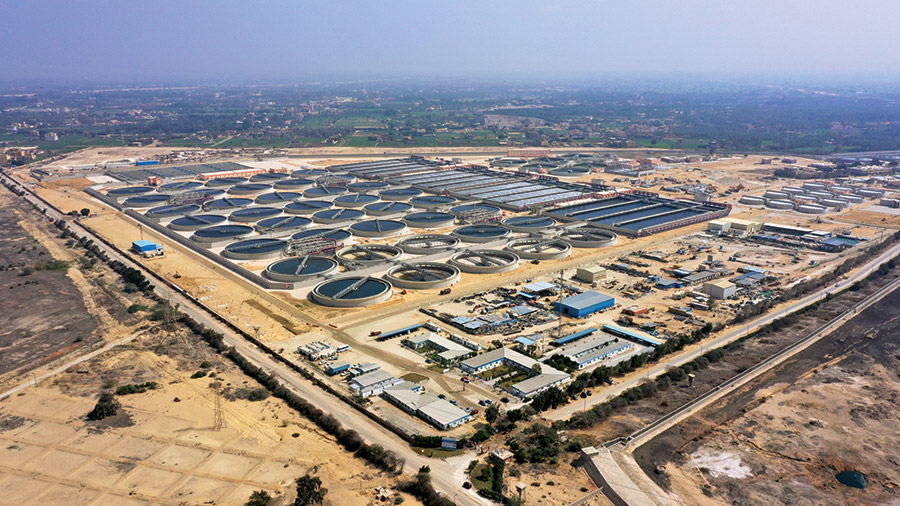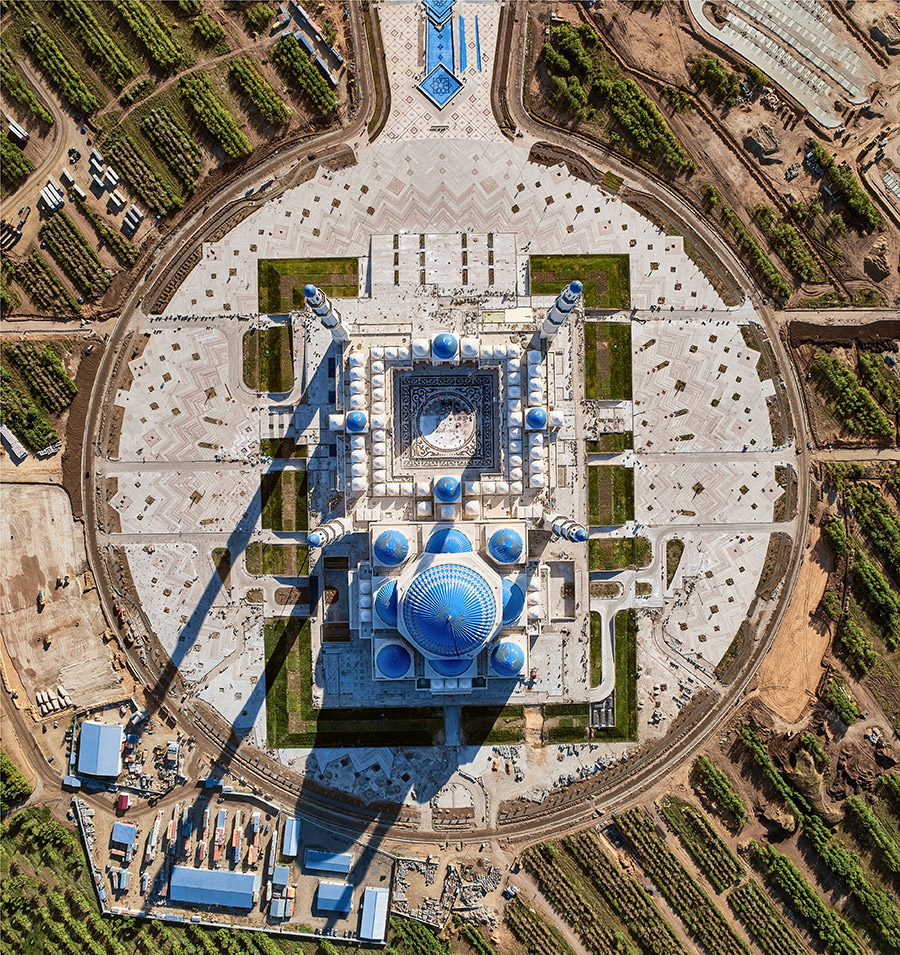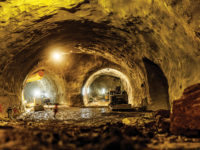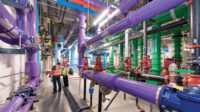Amid an increasingly complex global construction market, Top 250 International Contractors report that owners are placing a greater emphasis on meeting basic project goals—delivered on time, under budget and at promised value. But with supply chains still rebounding from COVID-19, and some economies now feeling the ripples of war in Ukraine, even basic work needs skill and strategy from contractors to keep rising construction costs and risks in check.
Overall, Top 250 contractors saw their revenue recover in 2021. The median international revenue for listed firms rose 5.89%, to $437.77 million from $413.4 million previously. Of the 236 firms that filed in both 2020 and 2021, 62.3% boosted their international revenue. That number rises to 76% when considering this year’s top 25, with the average increase for this group coming in at 7.1%.
International revenue for the Top 250 contractors fell 5.35% between 2020 and 2021. However, most of that decrease is attributable to a change in accounting. ACS and Hochtief filed jointly for the first time this year, removing some shared revenue. The firms had previously maintained separate ENR filings since ACS acquired a majority interest in Hochtief in 2011.
Although the Top 250 contractors named a mix of countries when asked about best market opportunity and why, the common denominator for many firms were regions with infrastructure investment.
Building on the momentum of massive government-funded infrastructure packages, firms say infrastructure development platforms prioritizing sustainability and clean energy are driving forces in the global contracting market’s recovery.
For this reason, the $1.2-trillion Infrastructure Investment and Jobs Act has made the U.S. sector an opportunity hotspot for many Top 250 contractors.
Similarly, Saudi Arabia’s Vision 2030 and China’s plan to spend $1.1 trillion on infrastructure will also drive economic recovery in those regions. In Europe, the more than $800-billion NextGenerationEU package is leading infrastructure investment in the Balkans and across Nordic countries. There also is Africa’s ambitious 2063 agenda, which has set a blueprint for the continent’s long-term sustainable development and economic independence.
Politics at Play
As sweeping and wide-ranging as such infrastructure spending plans may be, political and economic instability can bring major winds of change to regions.
Since Russia’s declaration of war on Ukraine, the conflict has increased fossil fuel prices, accelerating the shift to alternative energy, explains Alan Gelder, vice president of refining, chemicals and oil markets for research and consulting firm Wood Mackenzie. “The challenge around an energy transition is typically that a new technology costs more,” he says. “Because we’ve now got high fossil fuel [prices], that counterbalances that.”
The immediate winners have been the major fossil fuel producers in the Middle East, Gelder explains. But with countries seeking to untangle themselves from Russia’s energy sector and long-term business dealings with the country, Gelder says the renewable energy transition could ease demand and bring costs down.

“COVID-19 and the global economic situation has directly affected business expectations [for] all projects.”
Manuel Olivares Blázquez, Managing Director, FCC Construcción
“So not only have you got countries wanting to reduce their dependence on fossil fuels because energy has been weaponized, the consumer is also much more amenable because of the very high prices that we have seen for refined products and transport fuels,” he says.
With economists warning that the combined effects of COVID-19 disruptions and the war in Ukraine could push global economies into a recession, Gelder said Wood Mackenzie is watching markets for “recession risk, global economic activity as a result of rising inflation and the response of central banks.”
With Russian billionaire Oleg Deripaska as a major shareholder, Austria’s Strabag SE was put on the spot when Russia invaded Ukraine. Strabag is controlled by a syndicate including two large Austrian entities along with a 27.78% stake by the company Rasperia, which is controlled by the sanctioned Deripaska.
To comply with recent sanctions, the company decided not to pay a dividend to Rasperia this June. Rasperia’s single supervisory board member was also dismissed and the syndicate dissolved.
Since the invasion, Strabag has wound down its “very small” activities in Russia, accounting for 0.3% of group sales, says CEO Thomas Birtel. Strabag had been cutting back since Russia’s 2014 occupation of Crimea, he adds.
The contractor had started pulling out of Ukraine in 2011 because of an “incredible amount of corruption and non-compliant businesses practices,” Birtel says. Strabag sold its last assets, two quarries, last year.
Despite economic reports, the CEO believes the global contracting market will be largely protected from the effects of a recession because of the abundance of demand in the infrastructure sector. “On the contrary, probably [a recession] would be seen as a stimulus,” he says, “to further invest in infrastructure.” More than half of Strabag’s contracts are with public authorities.
While international contractors last year focused on navigating supply chain disruptions and material shortages, Birtel predicts this year’s main challenge will be to keep costs down. Given strong demand last year despite inflation, “we managed to convey the increased costs to our customers,” he says, adding: “We managed to generate an all-time high result.”
Wastewater Treatment Construction
Spain’s FCC Leads Expanded Clean Water Access in Giza

FCC SA (No. 34) leads the consortium delivering the $320-million expansion of the Abou Rawash wastewater treatment facility in Giza, Egypt. The project is set to enlarge plant capacity to 1.6 million cu meters from 1.2 million cu meters treated daily, and add biological treatment, in providing service to six million people. This is FCC’s third major project in Egypt, one of which, the New Cairo Wastewater Treatment plant, was also the first public-private partnership in the country. The contract includes a three-year operation and maintenance period.
Market Challenges and Solutions
“Without a doubt, COVID-19 and the global economic situation has directly affected business expectations [for] all projects being developed,” says Manuel Olivares Blázquez, managing director of bidding, commercial and America at FCC Construcción. The company is anticipating major project opportunities in North America, Europe and the Middle East. Blázquez explains that secure project financing and room for FCC to add value to a project are the main components for the company to enter a market.
Understanding a country’s market at a local level “will determine the success of the company in the country and in the international market,” he says.
To connect the company to various assets around the world, FCC Construcción is developing what it calls a “BIM Digital Construction Implementation Plan” that will provide continuity to technical-economic control tools throughout a project’s life cycle.
TAV Construction, based in Istanbul, Turkey, is following a similar approach with its projects in the Gulf Cooperation Council (GCC) region located around the Persian Gulf. “Our motto is ‘connectivity is productivity,’” says company Chairman Mustafa Sani Sener. “We use state-of-the-art project management tools, building information modeling technology, online project management and collaboration software to increase the level of this coordination and integration.”
Through its work on airport projects in the region, TAV has been able to expand company capacity in the international contracting market and build relationships, says Sener.
“One of my criteria for defining a successful project is that the project brings repeat business,” says Sener. He adds that TAV has secured multibillion-dollar contracts at five airports located in the six GCC countries—Qatar, Bahrain, Kuwait, Oman, UAE and Saudi Arabia.
Despite the construction industry being “very traditional and resistant to change,” says Sener, “emerging technologies have promising applications in projects because they can help a lot in reducing costs and increasing safety.”
The experience, professionalism and flexibility of COMSA Corporación teams have helped the company overcome market challenges, says Guillermo Loren, CEO of infrastructure, engineering and services. The company is working on projects in Denmark, Sweden, Croatia, Brazil and Mexico, as well as in Spain, where it is headquartered.

“Every location brings unique challenges that need attention and careful management.”
Ailie MacAdam, Mining and Metals Business President, Bechtel
“The management of international contracts, the need to bring the best of our teams—technical, human and material—and the adaptation to the environment have been incorporated into our business culture,” Loren says.
He emphasizes that this strategy has allowed the company to “adapt in all the environments and countries where we operate … always relying on knowledge of the local market and the customs relevant to each country.”
Solid Numbers
New international contracts for the Top 250 are up 5.14%, rising to $547.2 billion from $520.4 billion in 2020.
Backlogs also rose, with 50.2% of firms reporting an increase on this year’s survey. That number was 43.9% last year. Also, 27.5% of firms chose to decrease their international office staffing this year—a marked change from last year when 41.7% reported a decrease.
Despite turmoil in Ukraine, “we are growing revenue and have a solid order backlog,” says Anders Danielsson, president and CEO of Sweden’s Skanska A.B., ranked No. 8. “We have been able to manage the supply chain disruption and cost increases.”
In this year’s second quarter, construction operations “continued to deliver strong results [with] residential development maintaining the profitability level,” he says, noting a high level of activity with good margins in commercial real estate.
Skanska’s backlog over 17 months of production is particularly strong in Sweden but “somewhat lower in [other parts of] Europe,” says Danielsson. “That’s not a surprise since we have been more impacted by the war in Ukraine, especially in Central Europe. We have been very careful and selective when we bid for new projects.” In the U.S., he says the company is “quite comfortable” with 19 months of production backlog secured.
In this year’s second quarter, Skanska reported a $137-million operating profit on nearly $3.9 billion of construction sales. Construction’s 3.4% operating margin in the second quarter was fractionally lower than last year’s on a like-for-like basis.
Generally, Danielsson is dissatisfied with margins in the Nordics and demands more from the Swedish business where “we have an action plan in place,” he says. U.S. construction margins are “back on track [and] performing at a high level,” he adds.
For the next 12 months, Danielsson foresees stable non-residential construction demand in Sweden, Norway and the U.S. The outlook in Finland and Central Europe “is a bit weaker.” The civil market is overall stable in Europe and “strong in the U.S.,” he adds.
Spain’s Acciona Construccion S.A. reported a record infrastructure backlog and an overall 35.6% rise in net profit to $207 million in this year’s first six months over the same period in 2021. Also, infrastructure business sales were up 20.6%, generating an 18.8% rise in gross profits.
In a major win, an Acciona consortium this month secured a 20-year, $1.3-billion loan from Brazil’s National Bank for Economic and Social Development to partly finance continuing construction of Line 6 on the São Paulo metro.
The consortium, Concessionária Linha Universidade, has a $3.5-billion design-build-maintain-operate contract for the 15.3-km, single-tunnel subway. With a 47% stake, Acciona leads the consortium. It took over the project in late 2020 after the original consortium quit having completed around 10% of the work.
“There is no doubt that the market environment is complicated,” says Pietro Salini, CEO of Italy’s Webuild S.p.A. But “the overall market is strong,” he adds. So far, sales for the company this year rose 24% to $4 billion, while earnings before interest, taxes, depreciation and amortization grew by 33% to $259 million.
In six months, Webuild secured or became preferred bidder for $8.3 billion in contracts, beating the whole year’s target, says Salini. That work was achieved abroad, but he anticipates bidding for $13.4 billion of Italian contracts under the country’s national plan for recovery and resilience (PNRR) during this year.
Despite the Italian government’s collapse in July, “we are confident the PNRR will go ahead,” adds Salini. “It is a unique opportunity for Italy, a once-in-a-lifetime chance that nobody wants to let pass.”
Meanwhile, foreign contracts generated more than 70% of Webuild sales in this year’s first half. In North America, its largest foreign market that accounts for 21% of sales, Webuild operates through U.S.-based subsidiary Lane Construction Corp.
Australia, a newer and growing market for Webuild, generated 14% of sales, due largely to work on the 2,000-MW pumped storage project in the Snowy Mountains of New South Wales. In Europe, outside Italy, “France remains a high potential market,” despite tough local competition, says Salini.
Germany-based, Spanish-owned Hochtief A.G. this year grew its interest in Asia-Pacific and in particularly expansive Australia by acquiring roughly 20% of CIMIC Group Ltd. for $971 million. Through CIMIC, Hochtief made nearly one-third of last year’s $22-billion group sales in Asia-Pacific, second only to the 65% attributed to the Americas. Germany accounted for just 4%, while the rest of Europe contributed 2%.
Formerly known as Leighton Holdings, CIMIC comprises various construction firms including CPB Contractors and Leighton Asia. Operating in around 20 countries, but mainly in Australia, CIMIC recorded $6.9 billion in revenue last year.
Because of its global spread and de-risked order book, executives believe the group to be resilient in the face of inflation and supply-chain challenges. Hochtief in July appointed Juan Santamaría as CEO, taking the role in addition to one as CEO of parent company ACS. He previously served as CIMIC CEO and executive chairman until this past May.
Cultural/Worship
Sembol’s Grand Mosque

Photo courtesy of Sembol
Sembol (No. 111) has nearly finished construction on the Grand Mosque in Nur-Sultan, Kazakhstan. Set to be one of the largest mosques in Central Asia, it will have an enclosed area of 68,060 sq meters and accommodate up to 30,000 worshippers. The structure will feature 73 domes, including an 83-m-high main dome.
Planning Ahead
As the global contracting market continues to lurch forward in its recovery and public agencies roll out more infrastructure projects, “every location brings unique challenges that need attention and careful management” from contractors, says Ailie MacAdam, president of Bechtel’s global mining and metals business. Ranked No. 19 this year, the company works across all seven continents.
MacAdam shares that Bechtel recently launched a manufacturing and technology business to meet an expected need from customers in sectors such as semiconductors, electric vehicles, synthetic materials and data centers.
“The business addresses the growing demands for engineering, procurement and construction services needed to help our customers deliver the next generation of manufacturing—which is consistent with our approach to adapt and turn the company to where we see emerging challenges and demand,” she says.
Ferrovial’s new energy infrastructure and mobility business unit was created to promote and develop new sustainable business opportunities as owners prioritize emissions reduction goals and the clean energy transition.
“Currently, the main assets of this business line are electric vehicles, transmission lines and a photovoltaic plant,” says CEO Ignacio Gastón. “Despite the unpredictability of the issues that can condition the evolution of the unit, we have the certainty to keep working on electrification and sustainable mobility, especially in cities.”
Nehal Salah, strategic planning and sustainability manager at Egyptian Maintenance Co., says the company’s focus has been on cost optimization and resource allocation, “keeping up the development of our human capital and coping dynamically with the updated techniques and solutions.” She adds that there is “a different nature” for each market.
“Adding value to our clients and gaining their satisfaction and loyalty by doing our best to deliver on time in the safest manner with the highest quality standards, we manage to work professionally and smoothly in domestic and international markets,” Salah points out.
For India-based Larsen & Toubro, “strong project risk management systems” have enabled the company to do well over time, says S. N. Subrahmanyan, CEO and managing director. The company’s digitalization initiatives have improved their efficiency and productivity, he says, and it is also working on a multiyear cyber security assurance framework that will uniformly ramp up controls across all of its business units.
“Our previous digital efforts helped us maintain continuity of operations,” Subrahmanyan explains. “Digital initiatives toward smart manufacturing have ensured real-time safety and enhanced productivity, global quality, on-time delivery and unique customer experience in the supply of complex engineered-to-order, high-technology equipment to varied industries.”
The company also has boosted its deployment of high-tech tools such as IoT, drones, BIM, the Cloud, augmented reality, virtual reality, analytics and artificial intelligence, according to Subrahmanyan.
“Overall, digitalization is an ongoing journey, and all possibilities will be explored and implemented in the future, too,” he says.








Post a comment to this article
Report Abusive Comment